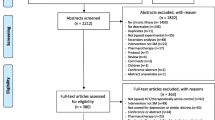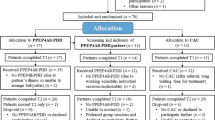Abstract
Depression often accompanies chronic illness. Study aims included determining (1) the level of current depression (Patient Health Questionnaire (PHQ)-8 ≥ 10) for two sets of Chronic Disease Self-Management Programs (CDSMP) participants; (2) if depression or other outcomes improved for those with PHQ-8 ≥ 10; and (3) if outcomes differed for participants with or without depression. This study utilized longitudinal secondary data analysis of depression cohorts (PHQ-8 ≥ 10) from two independent translational implementations of the CDSMP, small-group (N = 175) and Internet-based (N = 110). At baseline, 27 and 55 % of the two samples had PHQ-8 10 or greater. This decreased to 16 and 37 % by 12 months (p < 0.001). Both depressed and non-depressed cohorts demonstrated improvements in most 12-month outcomes (pain, fatigue, activity limitations, and medication adherence). The CDSMP was associated with long-term improvements in depression regardless of delivery mode or location, and the programs appeared beneficial for participants with and without depression.
Similar content being viewed by others
References
Corbin, Strauss. Unending work and care: managing chronic illness at home. San Francisco: Jossey-Bass; 1988.
Gavard JA, Lustman PJ, Clouse RE. Prevalence of depression in adults with diabetes: an epidemiological evaluation. Diabetes Care. 1993; 16(8): 1167-1178. doi:10.2337/diacare.16.8.1167.
Egede LE. Major depression in individuals with chronic medical disorders: prevalence, correlates and association with health resource utilization, lost productivity and functional disability. Gen Hosp Psychiatry. 2007; 29: 409-416.
Gunn J, Ayton DR, Densley K, et al. The association between chronic illness, multimorbidity and depressive symptoms in an Australian primary care cohort. Soc Psychiatry Epidemiol. 2012; 47(2): 175-184. doi:10.1007/s00127-010-0330-z.
Stanners M, Barton C. Depression in the context of chronic and multiple chronic illnesses. In: Olisah V, ed. Essential notes in psychiatry. Rijeka: InTech; 2012: 535-546. doi:10.5772/38470. Available at http://www.intechopen.com/books/essential-notes-in-psychiatry/depression-in-the-context-of-chronic-and-multiple-chronic-illnesses.
Grenard JL, Munjas BA, Adams JL, et al. Depression and medication adherence in the treatment of chronic diseases in the United States: a meta-analysis. J Gen Intern Med. 2011; 26(10): 1175-1182. doi:10.1007/s11606-011-1704-y.
DiMatteo M, Lepper HS, et al. Depression is a risk factor for noncompliance with medical treatment: meta-analysis of the effects of anxiety and depression on patient adherence. Arch Intern Med. 2000; 160(14): 2101-2107.
Wu SF, Huang YC, Lee MC, Wang TJ, Tung HH, Wu MP. Self-efficacy, self-care behavior, anxiety, and depression in Taiwanese with type 2 diabetes: a cross-section survey. Nurs Health Sci. 2013. doi:10.1111/nhs.12022.
Maddux JE, Meeier LJ. Self-efficacy and depression. In: Maddux JE, ed. Self-efficacy, adaptation, and adjustment: theory, research, and application. New York: Plenum Press; 1995: 141-169.
Reeves D, Kennedy A, Fullwood C, et al. Predicting who will benefit from an expert patients programme self-management course. Br J Gen Pract. 2008; 58: 198-201.
Ritter PL, Lee J, Lorig K. Moderators of chronic disease self-management programs: who benefits? Chronic Illn. 2011; 7(2): 162-172.
Ory MG, Ahn S, Jiang L, et al. National study of chronic disease self-management: six month outcome findings. J Aging Health. 2013; 25(7): 1258-1274.
Lorig K, Sobel DS, Stewart AL, et al. Evidence suggesting that a chronic disease self-management program can improve health status while reducing hospitalization: a randomized trial. Med Care. 1999; 37(1): 5-14.
Lorig KR, Ritter PL, Laurent DD, Plant K. Internet-based chronic disease self-management: a randomized trial. Med Care. 2006; 44(11): 964-971.
Cohen J. Statistical power analysis for the behavioral sciences. 2nd ed. Hillsdale: L. Erlbaum Associates; 1988.
Lorig K, Laurent DD, Laurent DD, Plant K, Krishna E, Ritter PL. The components of action planning and their associations with behavior and health outcomes. Chronic Illn. 2014; 10(1): 50-59. doi:10.1177/1742395313495572. Epub 2013 Jul 9.
Lorig KR, Ritter PL, Stewart AL, Sobel DS, Brown BW, Bandura A. Chronic disease self-management program: 2-year health status and health care utilization outcomes. Med Care. 2001; 39(11): 1217-1223.
Lorig KR, Ritter PL, González VM. Hispanic chronic disease self-management: a randomized community-based outcome trial. Nurs Res. 2003; 52(6): 361-369.
Dongbo F, Hua F, McGowan P, et al. Implementation and quantitative evaluation of chronic disease self-management program in Shanghai, China: randomized controlled trial. Bull World Health Organ. 2003; 81: 174-182.
Swerissen H, Belfrage J, Weeks A, et al. A randomized control trial of a self-management program for people with a chronic illness from Vietnamese, Chinese, Italian and Greek backgrounds. Patient Educ Couns. 2006; 64: 360-368.
Griffiths C, Motlib J, Azad A, et al. Randomised controlled trial of a lay-led self-management program for Bangladeshi patients with chronic disease. Br J Gen Pract. 2005; 55: 831-837.
Goeppinger J, Armstrong B, Schwartz T, Ensley D, Brady TJ. Self-management education for persons with arthritis managing comorbidity and eliminating health disparities. Arthritis Care Res. 2007; 57: 1081-1088.
Kennedy A, Reeves D, Bower P, et al. The effectiveness and cost effectiveness of a national lay-led self care support programme for patients with long-term conditions: a pragmatic randomised controlled trial. J Epidemiol Community Health. 2007; 61: 254-261.
Lorig KR, Ritter PL, Dost A, et al. The South Australia health chronic disease self-management internet trial. Health Educ Behav. 2012; 40(1): 67-77.
Lorig KR, Ritter PL, Dost A, Plant K, Laurent DD, McNeil I. The expert patients programme online, a 1-year study of an Internet-based self-management programme for people with long-term conditions. Chronic Illn. 2008; 4: 247-256.
Bandura A. Self-efficacy, the exercise of control. New York: Freeman; 1997.
Spitzer RL, Kroenke K, Williams JBW. Patient Health Questionnaire Study Group. Validity and utility of a self-report version of PRIME-MD: the PHQ primary care study. JAMA. 1999; 282: 1737-1744.
Kroenke K, Spritzer RL, Williams JBW. The PHQ-9, validity of a brief depression severity measure. J Gen Intern Med. 2001; 16(9): 606-613. doi:10.1046/j.1525-1497.2001.016009606.x.
Kroenke K, Strine TW, Spritzer RL, Williams JB, Berry JT, Mokdad AH. The PHQ-8 as a measure of current depression in the general population. J Affect Disord. 2009; 114(1–3): 163-173. doi:10.1016/j.jad.2008.06.026.
Razykov I, Ziegelstein RC, Whooley MA, Thombs BD. The PHQ-9 versus the PHQ-8—is item 9 useful for assessing suicide risk in coronary artery disease patients? Data from the Heart and Soul Study. J Psychosom Res. 2012; 73(3): 163-168. doi:10.1016/j.jpsychores.2012.06.001.
Kroenke K, Spitzer RL. The PHQ-9: a new depression diagnostic and severity measure. Psychiatr Ann. 2002; 32(9): 1-7.
Wells TS, Horton JL, LeardMann CA, Jacobson IG, Boyko EJ. A comparison of the PRIME-MD PHQ-9 and PHQ-8 in a large military prospective study, the Millennium Cohort Study. J Affect Disord. 2013; 148(1): 77-83. doi:10.1016/j.jad.2012.11.052.
Ritter P, González V, Laurent DD, Lorig KR. Measurement of pain using the visual numeric scale. J Rheumatol. 2006; 44(11): 964-971.
Dixon J, Bird H. Reproducibility along a 10-cm vertical visual analogue scale. Ann Rheum Dis. 1981; 40: 87-89.
Lorig K, Stewart A, Ritter P, González V, Laurent D, Lynch J. Outcome measures for health education and other health care interventions. Thousand Oaks: Sage Publications; 1996.
Morisky DE, Green LW, Levine DM. Concurrent and predictive validity of a self-reported measure of medication adherence. Med Care. 1986; 67–74.
Ritter PL, Stewart AL, Kaymaz H, Sobel DS, Block DA, Lorig KR. Self-reports of health.
Acknowledgments
This was an investigator-initiated secondary data analyses using data from two studies. The U.S. National Study was funded by the NCOA. Nancy Whitelaw was a principal investigator for the U.S. National Study and Audrey Alonis assisted with data collection and verification. The Healthy Living Canada Study was funded and administered by Alberta Health Services with software support and assistance from the NCOA. Doris Listoe of Alberta Health, Kathryn Plant at Stanford, and Jay Greenberg of NCOA were instrumental in administering and supporting the program and in collecting and managing data.
Conflict of interest
Laurent and Lorig receive royalties for the book that is used in the programs. There are no other potential conflicts of interest
Authors’ statement of and adherence to ethical standards
All procedures, including the informed consent process, were conducted in accordance with the ethical standards and were approved by the IRB boards of institutions involved in the two original studies.
Author information
Authors and Affiliations
Corresponding author
Additional information
Healthy Living Canada was registered at ClinicalTrials.gov as NCT01047514, and the U.S. National study was registered as NCT01845857,
Implications
Practice: On-line and small-group generic self-management programs are effective for those with depression and should be considered for implementation as part of chronic disease management programs which include people with depression.
Policy: The Chronic Disease Self-Management Program (CDSMP) should be considered as an effective evidence-based program for people with depression.
Research: New methods are needed for analyzing and reporting the results of self-management programs with heterogeneous populations.
About this article
Cite this article
Ritter, P.L., Ory, M.G., Laurent, D.D. et al. Effects of chronic disease self-management programs for participants with higher depression scores: secondary analyses of an on-line and a small-group program. Behav. Med. Pract. Policy Res. 4, 398–406 (2014). https://doi.org/10.1007/s13142-014-0277-9
Published:
Issue Date:
DOI: https://doi.org/10.1007/s13142-014-0277-9




